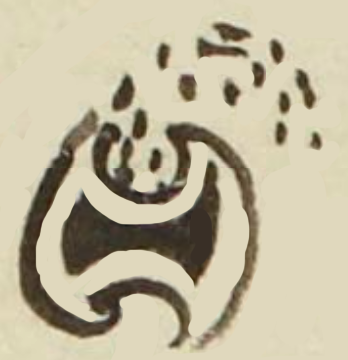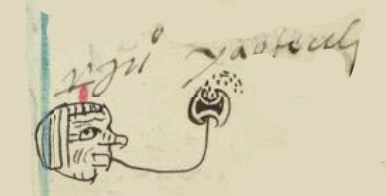Yaoteuh (MH797r)
This black-line drawing of the compound glyph for the personal name Yaoteuh (“Combatant-Dust”) is attested here as a man’s name. The glyph shows a war shield, black in the middle, with a white border, and four curving points. While a shield might be called a chimalli, it is often used as a sign in the Matrícular de Huexotzinco as a symbol for a combatant (yao-). Behind the shield is a group of dots, which seem to represent dust (teuhtli). They come up from behind and bend to the right, almost like smoke. But, if the teuhtli is not literal, the -teuh suffix could alternately serve as a phonetic indicator for “as, like, similar to.” In other words, the name could mean, perhaps, “Warlike.” Other examples of terms that end with -teuh can be found below.
Stephanie Wood
The Florentine Codex mentions dust in a setting where men were making war cries, raising dust and making the ground smoke. [See: Book 1, f. 1 verso, published in the Digital Florentine Codex. Dust might also be prized for making wind visible, making its movement more apparent.
Stephanie Wood
juo yaoteuh
Juan Yaoteuh
Stephanie Wood
1560
Jeff Haskett-Wood
polvo, nombres de hombres

Yaoteuh, a person’s name (as attested in Morelos, for example), https://nahuatl.wired-humanities.org/content/yaoteuh
yao(tl), enemy or combatant, https://nahuatl.wired-humanities.org/content/yaotl
teuh(tli), dust or filth, https://nahuatl.wired-humanities.org/content/teuhtli
-teuh, as, like, similar to, https://nahuatl.wired-humanities.org/content/teuh
Matrícula de Huexotzinco, folio 797r, World Digital Library, https://www.loc.gov/resource/gdcwdl.wdl_15282/?sp=668&st=image.
This manuscript is hosted by the Library of Congress and the World Digital Library; used here with the Creative Commons, “Attribution-NonCommercial-ShareAlike 3.0 License” (CC-BY-NC-SAq 3.0).







